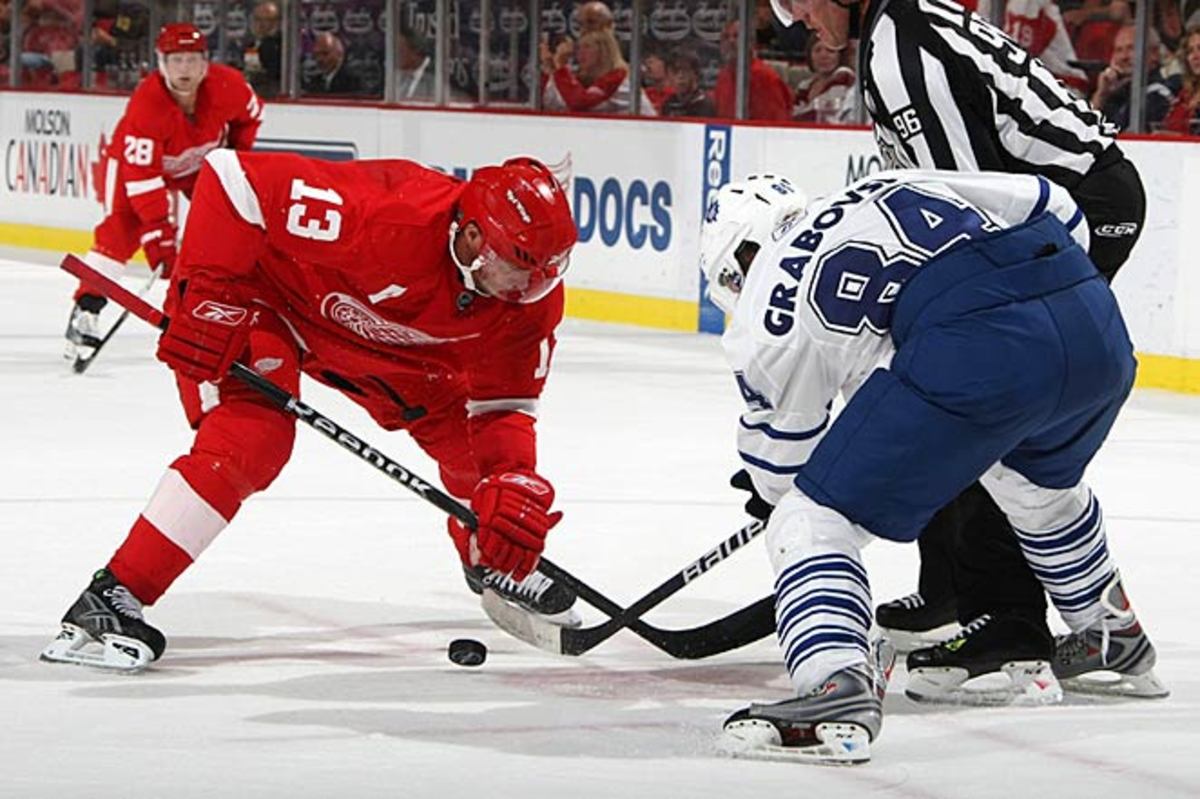
Who wins in the NHL's new realignment plan

The Red Wings should like being in an Eastern division with their Original Six brethren the Maple Leafs.
Dave Reginek/NHLI via Getty Images/SI
It's been 13 years since the Toronto Maple Leafs migrated East after somehow being tossed into the Western Conference, but the coming shuffle may not be the last we see in coming years. The secessions and annexations under the NHL's latest realignment proposal will likely be a boon for some teams, a disappointment for others, and a blow to the frequent flyer miles that the club from the fine Western Canadian city of Winnipeg has been enjoying due to its inclusion in the Eastern Conference.
Last year, the league proposed a realignment that was nixed by the NHL Players' Association on principle. With a new CBA in the balance, the NHLPA thought it was not the time for the players to allow the league to make such a sweeping decision without first consulting them. That would have set a precedent that indicated this current group of players and their representatives would be less likely to raise objections to other decisions in the future.
The other problem with that 2011 realignment plan was that it left the Red Wings in the Western Conference. (Center Pavel Datsyuk once joked, "My geography is really bad because I didn't know Michigan was next to California." ) Sure the Wings have a nice divisional rivalry going with the Chicago Blackhawks, but, hey, Detroit is actually located in the Eastern time zone, which makes trips to Dallas, Denver, California and the Pacific Northwest more of a draining hassle for the team as well as its fans who often have to stay up late to watch road games on the West Coast. While the Wings were awaiting the winner of a 2009 playoff series between Chicago and Vancouver to see who their next opponent would be, coach Mike Babcock was asked by a reporter which team he'd rather face. In many cases, this is about the most useless question possible as it is guaranteed to provoke the usual, "We respect the dickens out of both teams" response.
Babcock's reply: "Oh, Chicago for sure. It's a much easier flight."
So the Red Wings are a definite winner in the newest proposal that moves them to the East. They will lose the Hawks as a frequent foe, but they'll be in the same division (the new Central) with three other Original Six teams (Maple Leafs, Bruins and Canadiens) and conference with another (Rangers). In addition, they will make shorter trips to play Acela teams such as the Capitals, Flyers and Devils.
The Jets also win. Their nickname has been entirely appropriate because they have been using about a division's worth of jet fuel all by themselves, but It is high time for Winnipeg to stop keeping a schedule with Florida and Tampa Bay as virtual neighbors. After the former Thrashers moved from Atlanta following the 2010-11 season, there wasn't enough time to fit them into the Western Conference schedule for 2011-12. Then the newly-christened Jets were caught in the middle of the NHLPA's balk at the owners' first realignment plan. Now they are waiting through this year's shortened season, but their proposed home in a new Midwest Division that includes Minnesota, Chicago, Colorado, Dallas, Nashville and St. Louis will mean a kinder, gentler travel schedule.
The Blue Jackets were another team destined to stay in the West under the 2011 plan. Thanks to their proximity to Detroit (200 miles), they've had a rivalry with the Red Wings, and Blackhawks fans have been known to travel from Chicago to Columbus for games. A move to the proposed Atlantic Division (with the Hurricanes, Devils, Islanders, Rangers, Flyers, Capitals, Penguins) should kindle a rivalry with Pittsburgh (167 miles away), drawing Penguins fans and also allowing the Jackets to be seen more frequently in the East's largest markets.
The idea of overloading the schedule with intra-divisional contests has worked well in some cases. Pittsburgh-Philadelphia, New York-New Jersey, New York-New York, Boston-Montreal, and Calgary-Edmonton contests, for example, can be blood feuds, but the Dallas Stars don't really have an ongoing war in the Pacific with anyone from California. The Capitals never found a natural Southeast rival in any of their current divisional foes. The Caps have always played more spirited games against the Rangers, Flyers and Penguins than, say, the Panthers or Lightning. A move to the Atlantic will put them in a division with teams they don't care for and that snarl factor might be just the thing to wake them from their malaise.
Every team, and fans who want to see them all, will benefit from the new home-and-home format. If you live in Vancouver and want to see Sidney Crosby, you'll no longer have to wait two or even three years. He'll be there at least once each season. But here is a wrinkle:
With 16 teams in the East and 14 in the West, the imbalance seems perfect for the addition of two franchises. Yet despite some interest from Seattle --- which may have been hurt by the Oilers' new arena deal --- the most likely cities to receive a team (Quebec, Toronto, Hamilton) are all in the East. That may require an Eastern club or two to shift again if the league expands or moves teams into new markets at some point. The NHL and NHLPA will revisit the plan in 2016 to see if it needs any tweaking. For now, though, this latest edition should be enough to keep the water cooler talk bubbling.































